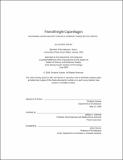| dc.contributor.advisor | William J. Mitchell. | en_US |
| dc.contributor.author | Outram, Christine | en_US |
| dc.contributor.other | Massachusetts Institute of Technology. Dept. of Architecture. | en_US |
| dc.date.accessioned | 2009-11-06T14:50:01Z | |
| dc.date.available | 2009-11-06T14:50:01Z | |
| dc.date.copyright | 2009 | en_US |
| dc.date.issued | 2009 | en_US |
| dc.identifier.uri | http://hdl.handle.net/1721.1/49545 | |
| dc.description | Thesis (S.M.)--Massachusetts Institute of Technology, Dept. of Architecture, 2009. | en_US |
| dc.description | This electronic version was submitted by the student author. The certified thesis is available in the Institute Archives and Special Collections. | en_US |
| dc.description | Page 151 blank. | en_US |
| dc.description | Includes bibliographical references (p. 140-150). | en_US |
| dc.description.abstract | Each day, in any given urban area, hundreds of thousands of small goods are distributed from their points-of-sale to their final destinations. The 'travel demand that is generated from this activity has a significant impact on congestion, pollution and the maintenance of infrastructure in cities. As such, and as the number of items distributed through urban areas continues to rise, city governments are showing increasing interest in strategies that can reduce these negative effects. Most of these strategies treat inner-city goods transportation as optimization issues, whereby an existing delivery system is made to operate more efficiently and effectively - oftentimes through utilizing advances in distributed digital technologies. What is proposed in this thesis, however, is an alternative approach -- a new type of service called FriendFreight, that exploits the untapped freight capacity of personal mobility vehicles, and the real-time location information of people and goods, to enable citizens to deliver items for others while moving through the city themselves. The success of such a service relies not only on the ability to transport goods in an optimal manner but also on an understanding of how and why people might deliver goods for each other. Thus, trust and reciprocity play an important role in the service design. In this thesis, the feasibility of FriendFreight is explored within the specific context of Copenhagen where I propose that the 175,000 bicycles that move through the city each day can be harnessed to deliver small items that people need regularly. | en_US |
| dc.description.abstract | (cont.) The mechanisms for building trust and reciprocity are determined through examining the theories of gift and market exchange. Special attention is also paid to our current sociological condition - what Manuel Castells calls the Network Society - whereby a rapid rise in digital electronic technologies has powered a transformation in social and operational exchange networks. Lastly, in collaboration with a colleague, Francesco Calabrese of the Senseable City Lab at MIT, a Matlab computer model has been developed as a framework for understanding a best-case scenario of the FriendFreight service and its potential effect on the efficient delivery of items given a particular scenario. This work shows that digital information can be harnessed in a bottom-up way to address urban issues in cities. Additionally it uncovers how and why exchange occurs between people, which results in a single framework for the FreindFreight service that maximizes reciprocity, trust and continued growth. Finally, it is found that a significant reduction in travel demand is achievable through using FriendFreight for certain types of goods in the context of Copenhagen. | en_US |
| dc.description.statementofresponsibility | by Christine Outram. | en_US |
| dc.format.extent | 151 p. | en_US |
| dc.language.iso | eng | en_US |
| dc.publisher | Massachusetts Institute of Technology | en_US |
| dc.rights | M.I.T. theses are protected by
copyright. They may be viewed from this source for any purpose, but
reproduction or distribution in any format is prohibited without written
permission. See provided URL for inquiries about permission. | en_US |
| dc.rights.uri | http://dspace.mit.edu/handle/1721.1/7582 | en_US |
| dc.subject | Architecture. | en_US |
| dc.title | FriendFreight Copenhagen : sustainable goods delivery through a community-based bicycle service | en_US |
| dc.title.alternative | Friend Freight Copenhagen : sustainable goods delivery through a community-based bicycle service | en_US |
| dc.title.alternative | Sustainable goods delivery through a community-based bicycle service | en_US |
| dc.type | Thesis | en_US |
| dc.description.degree | S.M. | en_US |
| dc.contributor.department | Massachusetts Institute of Technology. Department of Architecture | |
| dc.identifier.oclc | 441952475 | en_US |
